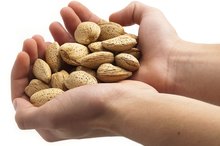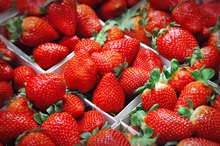What does fact checked mean?
At Healthfully, we strive to deliver objective content that is accurate and up-to-date. Our team periodically reviews articles in order to ensure content quality. The sources cited below consist of evidence from peer-reviewed journals, prominent medical organizations, academic associations, and government data.
The information contained on this site is for informational purposes only, and should not be used as a substitute for the advice of a professional health care provider. Please check with the appropriate physician regarding health questions and concerns. Although we strive to deliver accurate and up-to-date information, no guarantee to that effect is made.
The Best Foods to Lubricate the Knees
Because the knee is a weight-bearing joint involved in all many types of movement, it is susceptible to injury and wear-and-tear. The knee joint contains three bony structures: the femur, the tibia and the kneecap. The ends of each of these bones are covered in cartilage, and the spaces between the bones are filled with synovial fluid. Inflammation of the cartilage and synovial fluid leads to a loss of lubrication in the joint, according to research published in the Arthritis & Rheumatism journal 4. The result is arthritis. Unfortunately, there is not a single “magic” diet that cures arthritis. However, dietary changes are one of the easiest and cheapest ways to reduce inflammation and increase the lubrication of the knees.
Omega-3 Fatty Acids
Omega-3 fatty acids, a type of poly-unsaturated fat, have anti-inflammatory properties because they inhibit the production of cartilage-eroding compounds, according to nutrition expert Joy Bauer. Include foods high in omega-3 fatty acids such as eggs, flaxseed, walnuts and coldwater fish like salmon and tuna.
Vitamin C
Almonds: Nutrition & Inflammation
Learn More
Vitamin C helps keep your collagen healthy, which in turn keeps your cartilage healthy. As an antioxidant, vitamin C also reduces the effects of the free radicals responsible for inflammation. Vitamin C-rich foods include citrus fruits, brussel sprouts, kale, sweet peppers and strawberries.
Beta-Cryptoxanthin
Don’t let this name scare you. Beta-cryptoxanthin is simply a type A carotenoid such as the more familiar beta-carotene. Your body can convert it to vitamin A. Some research indicates this compound significantly reduces the chance of developing inflammatory arthritis. Because your body absorbs carotenoids better when you eat them with fat, include healthy sources of fat such as fish and olive oil with your beta-cryptoxanthin.
- Don’t let this name scare you.
- Your body can convert it to vitamin A.
- Some research indicates this compound significantly reduces the chance of developing inflammatory arthritis.
Quercetin
Anti-Inflammatory Foods List
Learn More
Quercetin is an antioxidant with strong anti-inflammatory effects. In fact, quercetin’s effects mimic those of aspirin and ibuprofen in reducing inflammation. To get more quercetin in your diet, include:
- apricots
- blueberries
- broccoli
- cocoa powder
- citrus fruits
- olive oil
- onions
Related Articles
References
- JointHealth: Diet and Nutrition
- Ohio State University Medical Center: Knee Pain
- Joy Bauer; Fight Arthritis With These Foods; 2007
- “Arthritis & Rheumatism”; Association of Articular Cartilage Degradation…; K.A. Elsaid et al.; June 2005
- University of Maryland Medical Center: Quercetin
- Jane Higdon; Carotenoids; December 2005
Writer Bio
Kat Black is a professional writer currently completing her doctorate in musicology/ She has won several prestigious awards for her research, and has had extensive training in classical music and dance.









